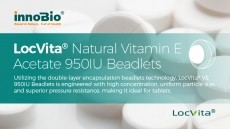SIDI protocol pushed forth by industry at IFT
Information on Dietary Ingredients (SIDI) protocol was yesterday
underscored by speakers at the IFT Expo.
The SIDI protocol was announced by trade associations in October 2006 and has the support of various ingredient manufacturers.
The protocol is designed to be implemented on a voluntary basis by the dietary supplement industry, so as to streamline the exchange of information between suppliers and manufacturers.
The speakers reiterated what the trade associations have been saying since the protocol's inception: that such a system will strengthen safe sourcing, thereby boosting consumer confidence in the products.
"SIDI will allow us to rebuild consumer confidence, which is the most important thing," Fortitech co-founder, Ram Chaudhari, told IFT attendees.
The issue of responsible ingredients sourcing has become unavoidable in the public eye with highly publicized contamination scandals inciting manufacturers to begin differentiating themselves from their competition.
Chinese food and cosmetic imports have been the first to be put under a negative spotlight of late as the result of contamination cases involving products from pet food to toothpaste.
"This industry is now challenged," said Nicola Jacobs, from B&D Nutritional Ingredients.
"We don't want to discriminate against export markets, but we need to know what's safe."
The current practice is for dietary supplement manufacturers - who are vetting ingredients suppliers to potentially work with - to send out lengthy questionnaires requesting detailed information on the materials.
According to the speakers, this system is flawed because it is inefficient and, more importantly, fosters inconsistency in product quality.
Some manufacturers ask detailed and relevant questions about the ingredients in question, but others ask very little.
In addition, suppliers say they receive a nearly unmanageable amount of questionnaires, meaning they are delayed in responding to manufacturers.
One of the companies adopting the system, Albion Advanced Nutrition, has subsequently experienced a faster turnaround time in making information available to manufacturers.
"This has made our quality control time better, and has made a direct way to update our customers on changes to Albion material," said Max Motyka, director of human nutrition at Albion.
SIDI provides the framework for suppliers to compile a database of pertinent information for manufacturers to readily access.
The system also means suppliers can update material information, but simultaneously keep manufacturers informed of these updates.
The parties involved are also looking to add a confidentiality agreement to the SIDI protocol so as to protect suppliers.
"You want information that in some cases is really proprietary," said Jacobs.
The program was launched by the Council for Responsible Nutrition (CRN), the Natural Products Association (NPA), the American Herbal Products Association and the Consumer Healthcare Products Association.
A number of companies have joined the SIDI fold and are beginning to set up such a system, but the speakers said they now need to coax more suppliers to leave the old system and take up the new one.
Aside from Albion and B&D, the other companies in the SIDI protocol working group are: BASF, Bayer, Cortex Scientific Botanicals, Colorcon, Embria Health Sciences, Indena, Kemin Health, Leiner, NBTY, NSF International, Nutramax Laboratories, Perrigo, Pharmavite, PL Thomas, Procter & Gamble, Nature's Way and Wyeth.













